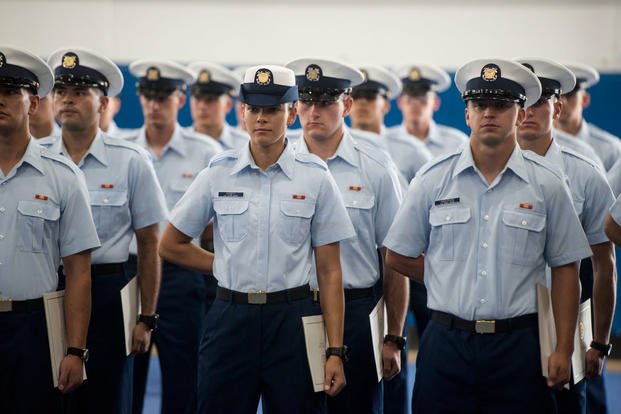While the Coast Guard is not slowing down in its most important national security operations as the U.S. enters its fifth week of a government shutdown, some activities have been halted or curtailed, and many newly minted Coasties find themselves stuck at recruit training, without funding to head to their first duty stations.
Lt. Cmdr. Scott McBride, a Coast Guard spokesman, told Military.com that recruits whose new units are not well suited to support them during the shutdown or lack the means to return home in the interim "will remain attached to the Training Center [in Cape May, New Jersey] for the duration of the lapse."
"There have been no immediate operational impacts related to recruit training; however, it is difficult to project the impact that the lapse in appropriations will have on mission readiness months or years from now," he said Wednesday.
There are currently 395 recruits in training. Seventy-six new Coasties graduated Jan. 18, he said.
Those who have the option to return home may receive a stipend from the government even as the shutdown continues.
"While the partial government shutdown prevents our ability to provide advance payment of reimbursable transfer expenses, it does not prevent us from issuing plane tickets for recruits to travel directly to units with the capacity to support them during the shutdown," McBride said.
Related content:
- Here's Everything the Coast Guard Did Without a Paycheck This Month
- Former Coast Guard Top Enlisted: We're Ashamed of Congress
- For First Time in Recent History, a US Military Service Is Working Without Pay
Often, recruits have the opportunity to return home for leave before reporting to their first assigned unit.
"In these cases, we have been able to coordinate temporary hometown recruiting assignments that allow graduates to make their desired trip home for leave, assist the workforce recruiting effort and temporarily defer execution of their permanent transfer and associated costs," McBride said. "For those who choose this option, there may be out-of-pocket costs, if the cost of a ticket home exceeds the cost allowance of government transportation to their new unit."
The Coast Guard will continue to monitor the situation but said that it does not plan on letting recruits leave Cape May without an approved transfer plan with appropriately allocated resources.
Elsewhere in the Coast Guard, the shutdown is also taking a toll on operations.
Boardings for safety checks, the issuance or renewals of merchant documentation and licensing, fisheries enforcement patrols and routine maintenance of aids to navigation have been delayed or downsized, McBride said.
Other modified operations include administrative functions, training, and maintenance for surface and aviation fleets, he said in an email.
"The Coast Guard will continue operations required by law that provide for national security or that protect life and property," he said, including monitoring coast lines, ports, harbors and inland waterways, as well as maritime intercept and environmental defense operations.
But for the men and women conducting these high-stress operations or deploying, the pressure is mounting as they go without paychecks, not knowing how they can provide for their families back home, said Steven Cantrell, who served as the 12th master chief petty officer for the service.
"They still have to go out and do their job and focus on the mission when sometimes it's a very unforgiving environment," he said in an interview with Military.com on Wednesday. He retired from the position last year.
"I wouldn't presume to think that anybody wouldn't give it 100 percent," Cantrell said, adding that the current situation does "weigh on people."
Members of the Coast Guard, which is part of the Department of Homeland Security, missed their first paychecks Jan. 15. If the shutdown continues, they will miss their second at the end of the month.
While shutdowns have occurred before, support services for members and families "will have to expand if it goes any longer," Cantrell said.
Coasties have been relying on donations, loans and even food pantries to sustain their families as they take on necessary duties such as search-and-rescue operations.
"It's one thing to sit back and go, 'Wow, why would I want to do that?' Because they don't have the option to say, 'Well, I'm just going to go home.' They've been deemed essential," Cantrell said, adding that morale is "probably low" in places around the country.
Cantrell said he is hopeful the next generation of service members' desire to serve will outweigh the current problems.
"People know it's not the Coast Guard that's doing this. And I'm 100 percent sure [leaders] have prepped the battlespace for those recruits to know what's going on in the service. And they do a really good job… at the Training Center ... [to get them] excited about the Coast Guard," he said.
While frustrations remain, Cantrell said he thinks it's unlikely there will be a significant or long-term national security impact, given the service has seen fluctuating or dwindling budgets before and was still able to press on.
But "it's a bitter pill to swallow even as a retiree, and I just can't imagine the young folks out there worrying about things that they shouldn't have to worry about," he said.
-- Oriana Pawlyk can be reached at oriana.pawlyk@military.com. Follow her on Twitter at @Oriana0214.











